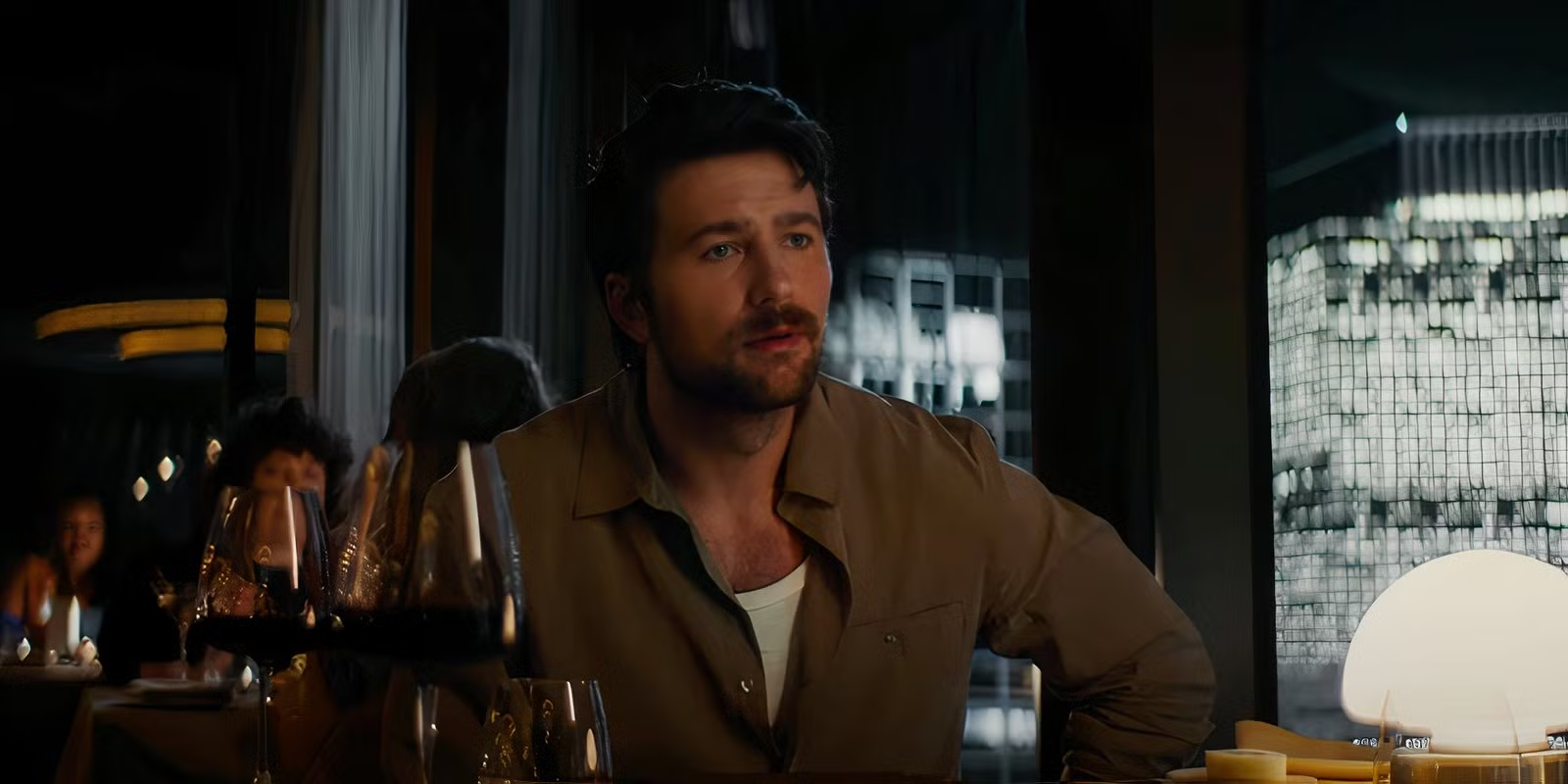
Final Rating: 4/5
In Drop, the latest movie from Happy Death Day director Christopher Landon, Meghann Fahy plays Violet, a woman on her first date years after the end of an abusive relationship. What initially promises to be a nice evening at a top-floor Chicago fine-dining establishment quickly turns sour when Violet receives an anonymous message to her phone threatening to kill her son if she doesn’t steal from – and later kill – her date.
The nature of the message – sent via DigiDrop, a legally-distinct app similar to Apple’s AirDrop – means that the sender must also be in the restaurant, so with quick thinking and some sharp detective work, Violet may be able to outsmart the culprit before her date ends in disaster.
Drop takes a fun premise – what if a kidnapper hijacked your night via targeted memes – and turns it into a stylish, high-stakes thriller. While it draws successfully from home-invasion movies, Drop stands out most as an exhilarating whodunnit. Writers Jillian Jacobs and Chris Roach excel at establishing stakes, the environment, and a series of instantly-memorable characters, while drip-feeding the audience clues to keep them on their toes.
Fahy is excellent as Violet, a social worker and domestic abuse survivor who keeps her cards close to her chest. Her history – split between flashbacks and answers to questions from her date – establishes her as a capable woman, but one caught in a terrifying situation. Fahy brings a perfect mix of paranoia, rage, and desperation to the role, her character forced to move between them on a dime.
Opposite Fahy is Brandon Sklenar as Henry, a photographer for the mayor who is sitting on a potentially career-ending scandal. Sklenar is charming and has chemistry with Fahy. As a character, Henry is generic: his main role is to be handsome, nice, and generally non-threatening. Still, it’s a shame that’s all he is.

In fact, Sklenar blends into the background more than many of the side characters, who all represent archetypal suspects in a classic mystery. There’s the excitable waiter, Matt (Jeffrey Self), working his first shift. The older, technologically challenged Richard (Reed Diamond), who is here on a blind date (it’s not going well). Connor (Travis Nelson), supposedly a regular customer, who spends the entire time sitting at a table in the corner on his phone. And Phil (Ed Weeks), the piano player, for whom sleaze is part of the job description.
None of them know Violet, but they all have a phone. Each is just as likely to be the messenger, and the filmmakers effectively create situations where each one is suspicious for at least a bit.
The real standout, however, is the cinematic depiction of technology. Security camera footage helps map out the restaurant and Violet’s house. Computer or phone screens are regularly used to include multiple points of view in a single scene. Most striking are the text messages from the kidnapper, rendered in bold letters in the space around Violet. In one shot, an ultimatum from the kidnapper is even reflected in a mirror, going from stylized subtitles to a physically imposing threat. The use of subtitles to fill the space around Violet drives home the tension of the situation, enabling Landon to portray multiple asynchronous conversations interfering with each other.

Marc Spicer’s cinematography effectively uses negative space to get the audience into Violet’s head. As she wrestles with whether to end a man’s life in order to save her son, Violet’s surroundings reflect her inner turmoil. At multiple points, the environment seems to melt away as Violet is engulfed by a vast emptiness. Impossible zoom outs of the restaurant centre Violet as a woman alone despite everyone around, trapped in a prison of her past as a survivor that manifests whenever it’s least convenient.
The most effective theme Drop communicates is the loneliness and paranoia in the wake of domestic abuse. Despite knowing herself to be a victim, Violet struggles not to blame herself for the abuse she suffered, and the dissolution of her previous relationship. Her self-isolation stems from the seeming impossibility of sharing her experience with anyone. Everything in her life so far has brought her to this point, so to which point will her actions at this restaurant bring her?
Despite its heavy core, Drop is consistently engaging, and a blast to watch. A classic whodunit in a glamorous place with high stakes and a fantastic lead. For a movie about a woman glued to her phone, Drop is impossible to look away from.



